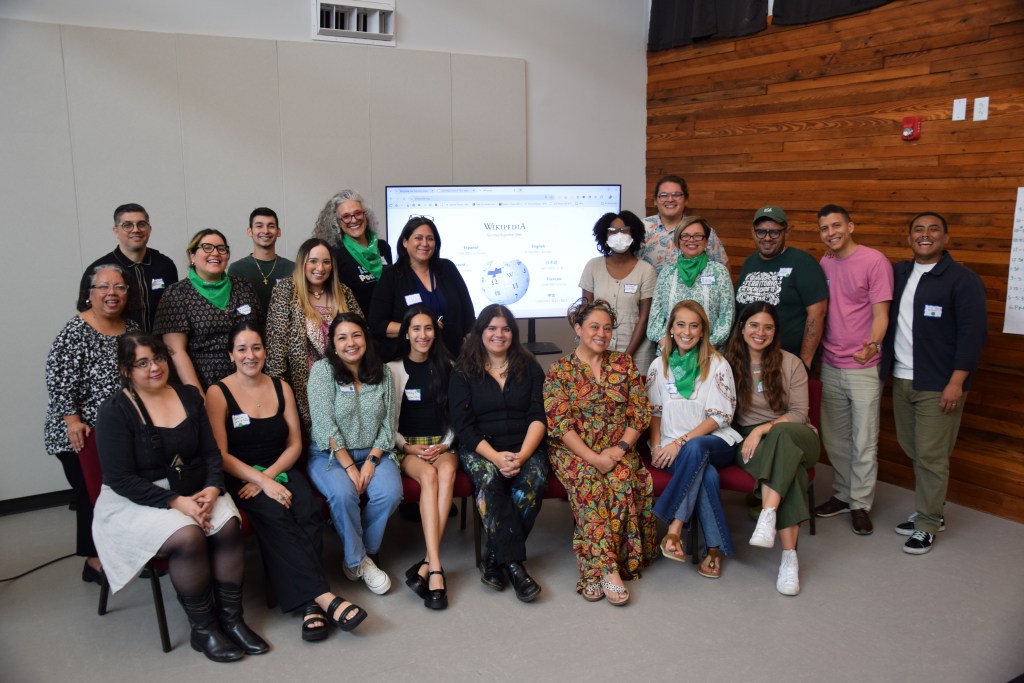
On May 4, 2024, Equis, an organization dedicated to empowering and mobilizing the Latino community in the United States, hosted the Repro in Texas Edit-a-Thon in Brownsville, focused on improving Wikipedia’s content related to reproductive rights in Texas. Equis’ objectives were to train and empower participants with the skills to edit Wikipedia, improve articles on reproductive rights in both English and Spanish, and foster a community of new editors.
The edit-a-thon was a vibrant, hands-on event where participants received training from an experienced editor. Participants were trained in the core principles of neutrality, reliable sources, and managing conflicts of interest. They learned to create accounts, use the sandbox for practice, edit articles using the visual editor, and translate articles using the translation tool. Throughout the day, attendees collaborated in groups to enhance and translate articles.
More than a year after the Supreme Court of the United States overturned Roe v. Wade, states like Texas have enacted and enforced legislation that complicates access to reproductive healthcare. This legislative landscape has left everyday Texans seeking reliable information online to understand their reproductive rights.
Equis is committed to creating and fostering a better understanding of Latinos in the United States and pioneering innovative approaches to engage them. Recognizing that Latinos are the second largest and fastest growing minority group in the United States, they work to ensure they encounter accurate and timely information online, and in their preferred language, empowering them to make informed decisions about the world around them. This commitment is embodied in the work they are doing on Wikipedia.
Wikipedia is a pivotal source of information shaping the understanding of millions globally, including a significant number of U.S.-based Latinos. In partnership with Harmony Labs, Equis conducted research that analyzed 11.5 million searches of 90,000 Latinos over two years. This analysis revealed that Wikipedia, alongside Facebook and YouTube, is one of the single most used websites by Latinos to seek and find information.
As a user-driven platform, Wikipedia embodies the principles of community engagement and open knowledge. However, there exists a significant gap in the representation of U.S.-based Latinos and content related to U.S. Latino history and culture. Therefore, It is clear that there is a need to train and empower U.S.-based Latinos to contribute accurate and timely information on Wikipedia to close these gaps. These efforts will work to close the knowledge, content, and representation gaps on Wikipedia, ensuring that Latino icons, history, and culture are well-represented.

Equis’ edit-a-thon aimed to clarify this landscape by training a new cohort of editors, particularly those from the Rio Grande Valley communities most impacted by these issues, and by adding accurate and comprehensive information on Wikipedia in both English and Spanish. They focused on articles such as Abortion in Texas, Rosie Jiménez, and Abortion Funds, which previously lacked Spanish versions.
What made this edit-a-thon particularly special was the sense of community and collaboration it fostered. The event featured a creative break with a screen printing activity led by a local artist, where participants printed designs on bandanas symbolizing their contributions to Wikipedia. This activity provided a fun and engaging way to recharge, further reinforcing the community spirit.
Feedback from participants was overwhelmingly positive. They appreciated the training sessions, the supportive environment, and the opportunity to contribute to an important cause. The urgency of accessible and accurate information on reproductive rights has never been more critical. By equipping local community members with the skills to contribute to Wikipedia, we ensure the platform better serves those navigating the complex and evolving landscape of reproductive healthcare legislation. This effort highlights the importance of community engagement and the power of collaborative efforts in building a more inclusive and informed digital landscape.

Can you help us translate this article?
In order for this article to reach as many people as possible we would like your help. Can you translate this article to get the message out?
Start translation